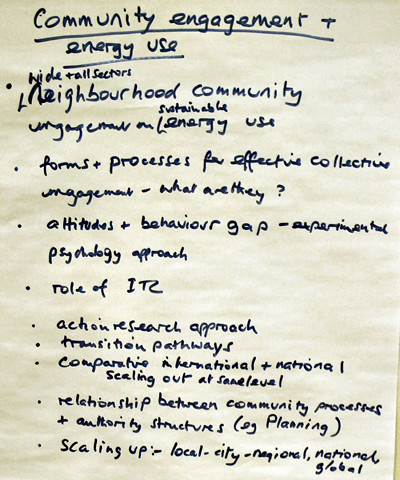ESRC complexity seminar 2: Energy and Climate Change: Contribution of Complexity Science
Organisers
- Professor Eve Mitleton-Kelly — LSE
- Professor Jeff Johnson — The Open University
Description
Organised jointly with Professor Jeff Johnson, The Open University.
Documents
- ESRC-ComplexityResSem2FlierUpdated.pdf
- ESRC-ComplexitySem2FeedbackCommunityEnergyUse.pdf
- ESRC-ComplexitySem2FeedbackNotesRenewables.pdf
- ESRC-ComplexitySem2ProvProg.pdf
Session 1: Energy Futures: The Challenge
Presenters
- Professor David Elliott
- Dr Stephen Peake
Description
Energy Futures: the Challenge Given climate change and concerns over energy security, key technological and strategic issues face us for a sustainable energy future. Dave Elliott looks at sustainable energy technologies, essentially the technological mitigation options, ranging from local domestic scale micro- gener-ation to macro continent-wide supergrids. Key issues are: What scales should we focus on - local, national, global? Which type of generation technologies should we emphasise? Electricity generation? Heat generation? How can we accelerate deployment of the mix of chosen technologies? Stephen Peake then asks will it be enough, or will we also need massive social and economic adaptation - including behavioural changes and more radical global political agreements or accommodations. The key issues are how long have we got, and can we adjust in time? David Elliott is Professor of Technology Policy specialising in sustainable energy technologies and renewable energy based systems. He is editor of Renew journal. Dr Stephen Peake is Senior Lecturer in Environmental Policy specialising in the social, cultural and technological dynamics of sustainable development, energy security and climate change diplomacy.
Documents
Session 2: Complexity Science and Policy
Presenters
- Professor Alan Wilson
Description
Sir Alan Wilson speaks about the interplay between policy and science in the search for practical solutions to the problem of finding and implementing sustainable energy sources in the context of climate change. Well known for his pioneering work on spatial interaction methods and dynamical systems theory in transportation and urban modelling, his interests concern the many aspects of mathematical modelling and planning in relation to all facets of cities and regions. He is been particularly concerned with comprehensive urban models in a dynamic framework, links between urban and ecological systems, and developments connecting network theory with spatial interaction modelling. Sir Alan Wilson became Professor of Urban and Regional Geography at Leeds University in 1970, and Vice Chancellor from 1991. He was elected a Fellow of the British Academy in 1994, and a Fellow of the Royal Society in 2006. He became first Director General for Higher Education by the UK Government in 2004, where he was a key adviser to various secretaries of state and played a critical role in the government’s drive to widen participation in higher education.
Documents
Session 3: Energy Policy and Climate Change
Presenters
- Lord David Puttnam
Description
David Puttnam will consider energy policy and climate change, drawing on his experience of working in education, the media and Parliament. Lord Puttnam spent thirty years as an independent film producer making many award winning films. Since 1998 he focuses on his work in education and the environment. This includes being Chancellor of the Open University, Deputy Chairman of Channel Four, Chairman of Futurelab, Chairman of Profero and Chairman of the Joint Parliamentary Climate Change Bill Scrutiny Committee. He is a trustee of the think tank the Institute for Public Policy Research and has been Chair of Trustees of the Forum for the Future.
Discussion of funding available from ESRC
Presenters
- Owen Dowsett — Research Directorate, ESRC
Documents
Energy and Climate Change: The Contribution of Complexity Science
Presenters
- Professor Jeff Johnson
